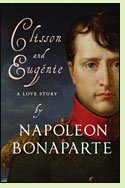Clisson and Eugenie
by Napoleon Bonaparte
Reviewed by Margaret Donsbach

Clisson and Eugénie is a quick and easy read, more short story than novella, that is worthwhile for the insight it offers into Napoleon Bonaparte's psyche if not for the story itself. It's a bit startling to discover that Napoleon - the man who ruled France after the Terror, swept across Europe in a frenzy of conquest, took on more than his massive army could handle in Russia, and went down in a defeat at Waterloo as oversized as his victories - also wrote romantic stories. But he wooed and won Josephine, one of history's more romantic figures.
As a young soldier bored with barracks life, Napoleon read novels to pass the time, which inspired him to try writing fiction himself. Clisson and Eugénie, although still in draft form, seems to be his most polished effort. "From birth," it begins, "Clisson was strongly attracted to war." Then, in summary form, it tells of Clisson's disillusion with military life, his attraction to a young woman, their happy marriage, and a new cycle of disillusion that follows. The story is thoughtful, even philosophical. There is charm in Clisson's enjoyment of nature and his choice of a sweetheart who "was like a [musical] piece by Paesiello which transports and elevates only those souls born to appreciate it." The scenes and settings remain sketchy, though, without enough sensory details or passages of back-and-forth dialogue to bring the characters and their surroundings to life.
Anyone trying to understand Napoleon the man can gain insights from Clisson and Eugénie. In this 2013 Gallic Books edition, translated into English by historian Peter Hicks, a foreword and afterward by French psychiatrist and novelist Armand Cabasson point out intriguing parallels between Napoleon's life and the characters and events in the story. Technically, this is not historical fiction, since the novella is set in Napoleon's own time. (written in 1795, first published edition in the original French 2007, Gallic Books paperback edition in English 2013; 77 pages - the novella itself runs 18 pages)
More about Clisson and Eugénie at Powell's Books or Amazon.comNovels about Napoleon and his love life:
The Song Of Departure by Max Gallo (1997 in the original French; English edition, 2004), about the first thirty years of Napoleon's life and his rise to power in the French Revolution, #1 in the Napoleon quartet. More info
Tales of Passion, Tales of Woe by Sandra Gulland (1998), about Josephine during the years of Napoleon's rise to power; #2 in the Josephine trilogy. More info
The Second Empress by Michelle Moran (2012), about Napoleon's second wife, Marie-Louise, and his sister Pauline. More info
Nonfiction about Napoleon:
Napoleon's Rules: Life and Career Lessons from Bonaparte by William Dietrich (2015). More info
Napoleon: The Path to Power by Philip Dwyer (2007). More info
Napoleon Bonaparte: An Intimate Biography by Vincent Cronin (1972). More info
Napoleon Bonaparte: A Life by Alan Schom (1997). More info
Online:
Napoleon at PBS.org
Back to Novels of the Napoleonic Era
Back to Directory of Book Reviews